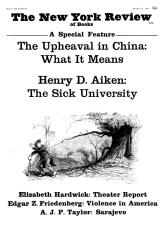In response to:
A Very Special Case from the July 28, 1966 issue
To the Editors:
A. J. P. Taylor’s causerie on Irish history, “A Very Special Case” [NYR, July 28], is an indication that Englishmen should not write on Irish subjects because of an. Anglocentrism which inheres in their attitude after long years of ascendency; the alteration of which they have not yet learned to adjust to in the lessening of British influence in world affairs. There is also a need to exculpate much of what Britain has done in Ireland, and a great deal of Mr. Taylor’s review of the three books on Irish history, considered under this title, is taken up with this matter.
This is evident in his assertion that the “Irish are their own masters” and “Nowhere except in one corner has liberation been more complete.” Yet this corner comprises six of the thirty-two counties of Ireland and almost one-third of the population of the whole of Ireland of pre-partition days is contained in this area. Here Irishmen who are national minded are living under conditions of a tendentious authority comparable to that of Spain and South Africa. The Government of Northern Ireland has repeatedly asserted that it is a “Protestant government for a Protestant people,” although nearly 35 per cent of the people of Northern Ireland are not Protestant, nor do they want to be associated with the North Irish government. There are Special Powers Acts of 1922 and 1933, still in force in Northern Ireland, which give the police powers of search without warrant, and of arrest and incarceration without charge, trial, and counsel. There is discrimination in employment, voting, and housing, all on the basis of religion, and in Derry City in 1955 with a population 63 per cent nationalist, the party of a united Ireland, not one nationalist was represented among 29 of the principal employees of the Derry Corporation who manage the affairs of the City.
It is good that Irishmen can write about their country in an ironic spirit and that there are such good relations between the Irish Republic and the British Government, but there can never be complete reconciliation until the Six Counties which were cut off from the rest of the country against the wishes of the majority of the Irish nation by the British Government under Lloyd George in the Government of Ireland Act of 1920 is returned to an integrated Irish nation.
The fantasy that Mr. Taylor conceives of an Ireland again under the aegis of Britain is so contrary to the best interests of this people itself that it would appear to be completely out of the question, and as the Irish people become better acquainted with their own history they will grow to a greater understanding of the disadvantages that the country has labored under in being associated with a British Government whose every lucubration seems to have been to have its life’s blood.
J. F. Branigan
Staten Island,
New York
This Issue
October 20, 1966



